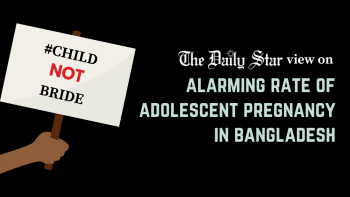Failure to check rising child marriage is inexcusable

We are alarmed by the latest findings of the Bangladesh Bureau of Statistics (BBS) about child marriage in Bangladesh. The most important finding, of course, is that a staggering 41.6 percent of young women were married off before the age of 18 in 2023. This figure—based on a survey conducted on 3.08 lakh households—marks a troubling upward trend over the previous three years. It means that not only have we failed to make any progress after the pandemic which saw a considerable increase in such occurrences, but we have even recorded a 10-percent increase since then. A similar spike was witnessed in other key indicators such as marriage before the age of 15 and adolescent pregnancies. Clearly, all the government's talk of reducing child marriage and ensuring learning recovery has amounted to nothing.
It bears recall that we have a law that exists to prevent precisely this kind of scenario. Under the Child Marriage Restraint Act 2017, the legal age for marriage is 18 for women. The consequences of not adhering to this restriction cannot be overstated. Child marriage not only robs young women of their childhood but also traps generations in a cycle of poverty and disempowerment. By truncating their education and forcing them into early pregnancies—which can have severe health implications—it limits their opportunities for personal and economic advancement. It's a scourge that also undermines the social and economic progress of the nation as a whole.
Why are the authorities failing to prevent it then? One may cite economic hardship, safety concerns, and entrenched social norms in rural areas, where most of the incidents occur. If you ask government officials, they too would shift the blame on these factors. But that cannot take away from the responsibility the authorities have of enforcing the law. Leaving aside the questionable provision allowing child marriages "under special circumstances", the law's enforcement remains woefully inadequate, which is inexcusable. For example, it mandates the establishment of child marriage prevention committees at national, district, upazila, and union levels. In reality, these are either non-existent or mostly dysfunctional. While some officials demonstrate proactive efforts, the scope of their work is limited, primarily focusing on awareness-raising rather than concrete intervention.
We, therefore, urge the government to ensure strict and total enforcement of the law. It also must address other contributing factors and ensure that no child is forced into marriage, however "reasonable" it may seem to their guardians. The government must build an enabling environment for girls to continue their education and utilise their potential.


 For all latest news, follow The Daily Star's Google News channel.
For all latest news, follow The Daily Star's Google News channel. 









Comments